Unit 7 Ways of communication单元提升卷(含答案)
文档属性
| 名称 | Unit 7 Ways of communication单元提升卷(含答案) |
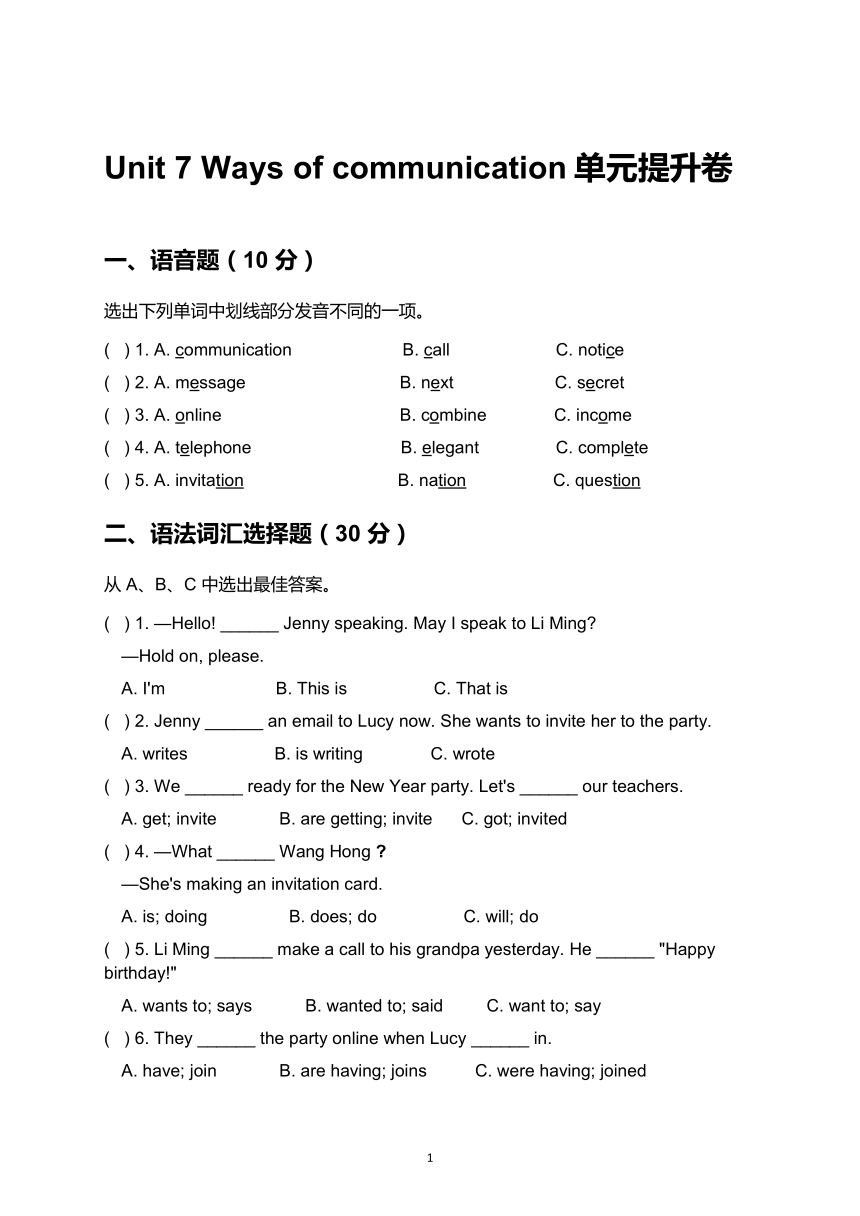
|
|
| 格式 | docx | ||
| 文件大小 | 25.4KB | ||
| 资源类型 | 试卷 | ||
| 版本资源 | 鲁科版(五四制) | ||
| 科目 | 英语 | ||
| 更新时间 | 2025-08-04 00:00:00 | ||
图片预览

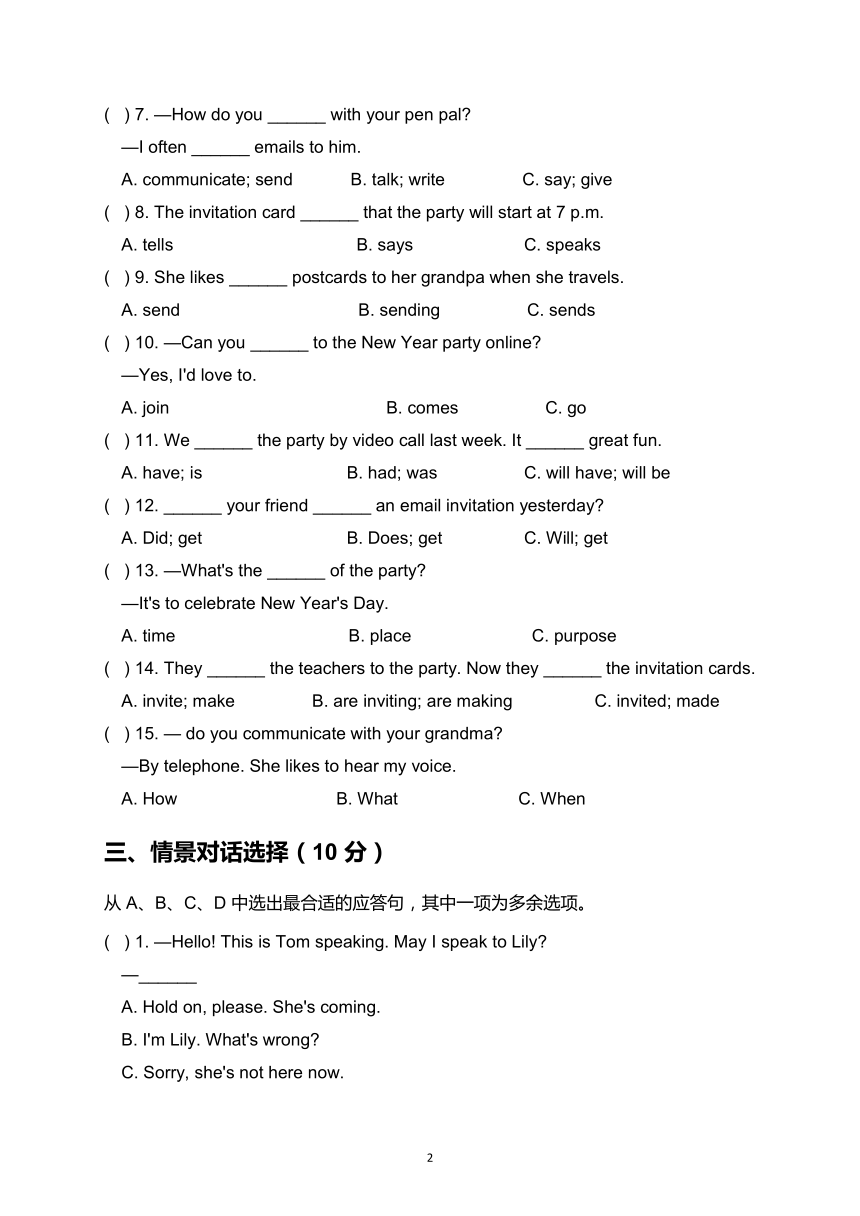
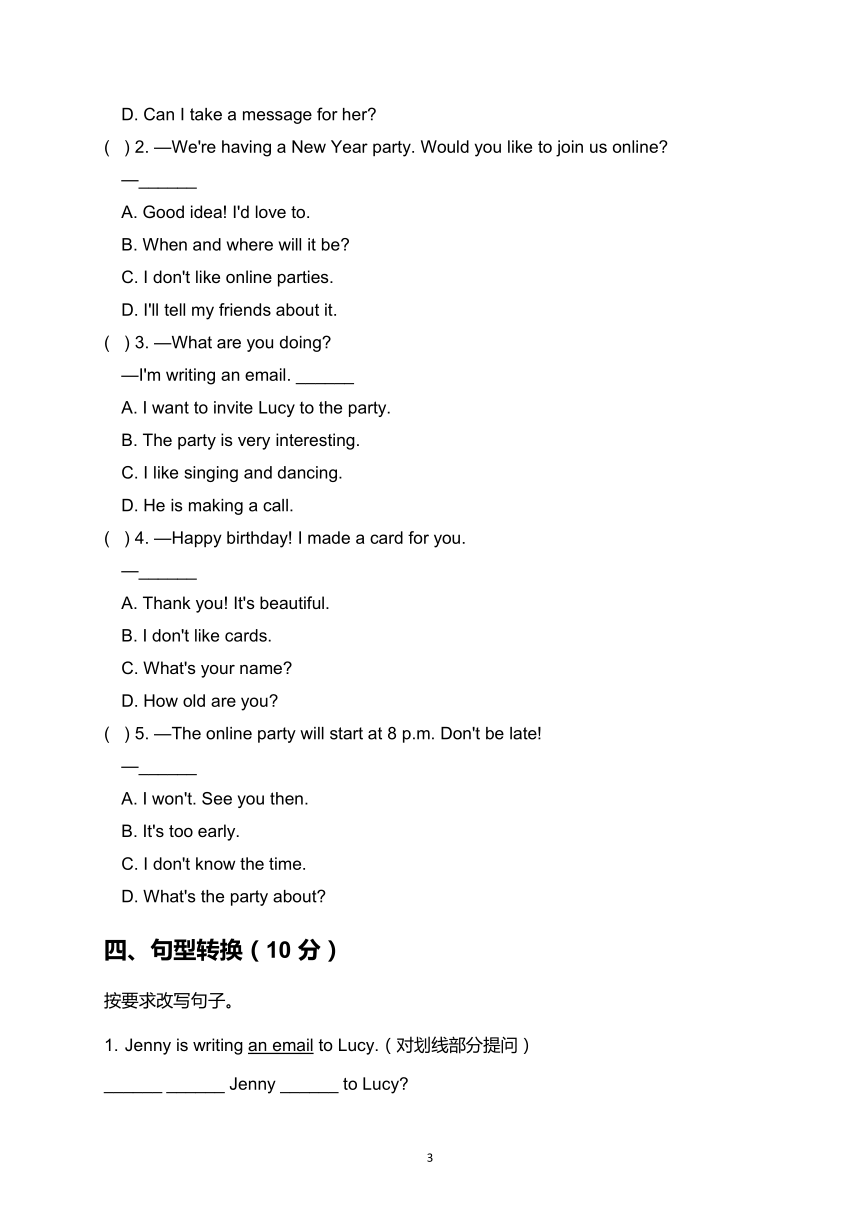
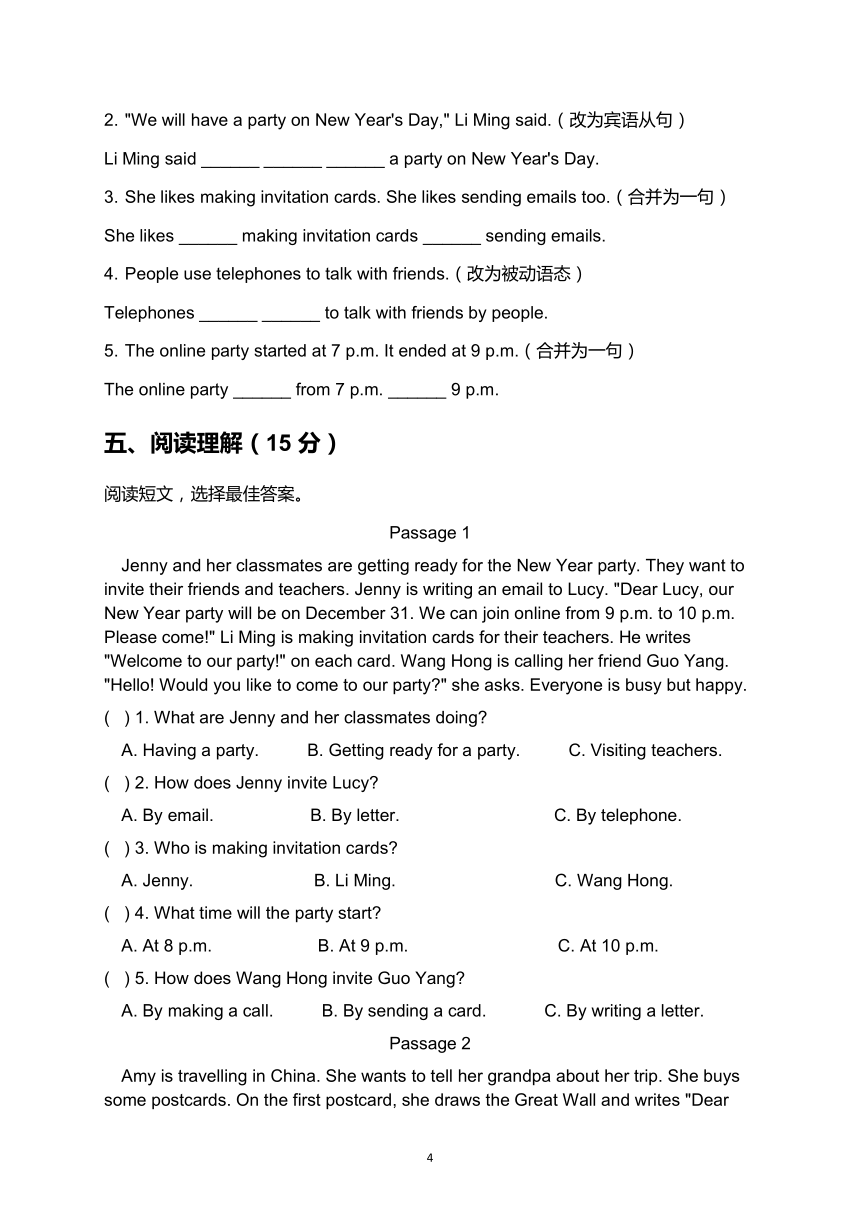
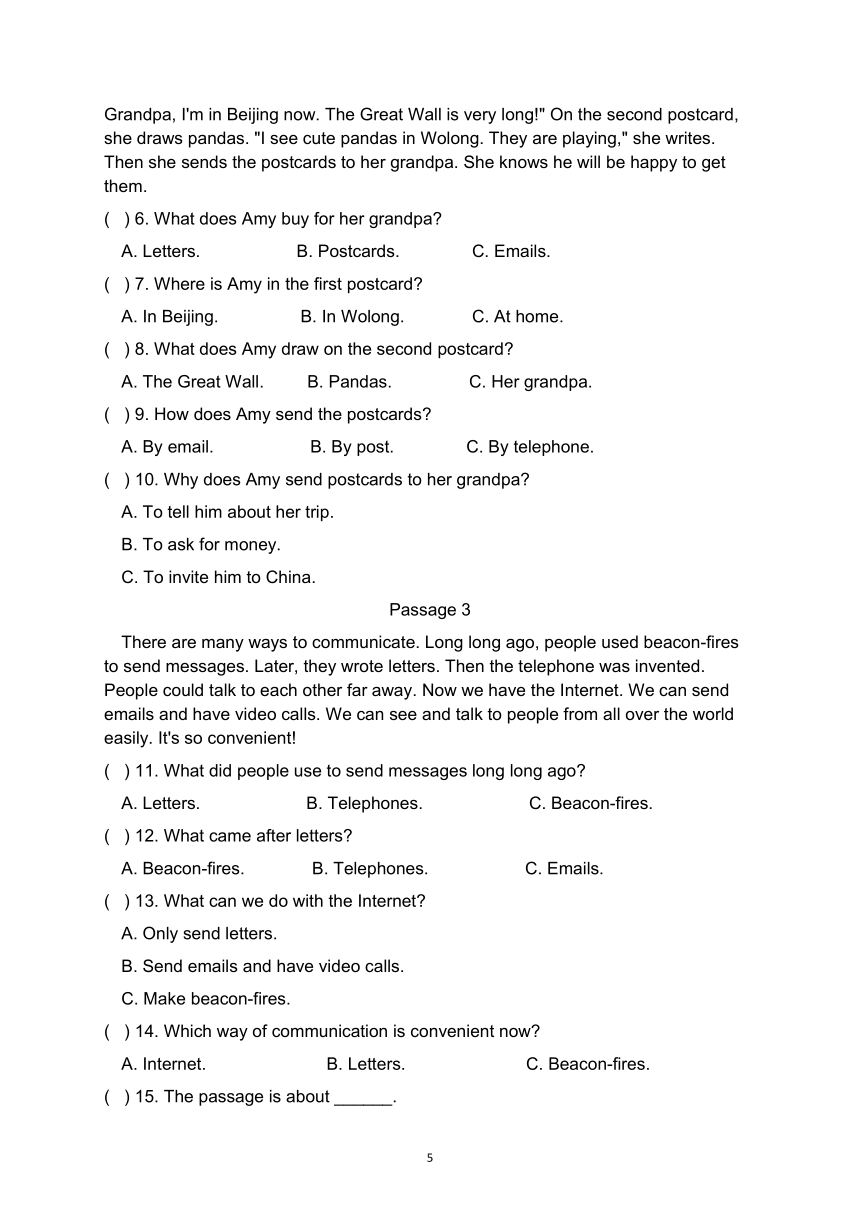
文档简介
Unit 7 Ways of communication单元提升卷
一、语音题(10 分)
选出下列单词中划线部分发音不同的一项。
( ) 1. A. communication B. call C. notice
( ) 2. A. message B. next C. secret
( ) 3. A. online B. combine C. income
( ) 4. A. telephone B. elegant C. complete
( ) 5. A. invitation B. nation C. question
二、语法词汇选择题(30 分)
从 A、B、C 中选出最佳答案。
( ) 1. —Hello! ______ Jenny speaking. May I speak to Li Ming
—Hold on, please.
A. I'm B. This is C. That is
( ) 2. Jenny ______ an email to Lucy now. She wants to invite her to the party.
A. writes B. is writing C. wrote
( ) 3. We ______ ready for the New Year party. Let's ______ our teachers.
A. get; invite B. are getting; invite C. got; invited
( ) 4. —What ______ Wang Hong
—She's making an invitation card.
A. is; doing B. does; do C. will; do
( ) 5. Li Ming ______ make a call to his grandpa yesterday. He ______ "Happy birthday!"
A. wants to; says B. wanted to; said C. want to; say
( ) 6. They ______ the party online when Lucy ______ in.
A. have; join B. are having; joins C. were having; joined
( ) 7. —How do you ______ with your pen pal
—I often ______ emails to him.
A. communicate; send B. talk; write C. say; give
( ) 8. The invitation card ______ that the party will start at 7 p.m.
A. tells B. says C. speaks
( ) 9. She likes ______ postcards to her grandpa when she travels.
A. send B. sending C. sends
( ) 10. —Can you ______ to the New Year party online
—Yes, I'd love to.
A. join B. comes C. go
( ) 11. We ______ the party by video call last week. It ______ great fun.
A. have; is B. had; was C. will have; will be
( ) 12. ______ your friend ______ an email invitation yesterday
A. Did; get B. Does; get C. Will; get
( ) 13. —What's the ______ of the party
—It's to celebrate New Year's Day.
A. time B. place C. purpose
( ) 14. They ______ the teachers to the party. Now they ______ the invitation cards.
A. invite; make B. are inviting; are making C. invited; made
( ) 15. — do you communicate with your grandma
—By telephone. She likes to hear my voice.
A. How B. What C. When
三、情景对话选择(10 分)
从 A、B、C、D 中选出最合适的应答句,其中一项为多余选项。
( ) 1. —Hello! This is Tom speaking. May I speak to Lily
—______
A. Hold on, please. She's coming.
B. I'm Lily. What's wrong
C. Sorry, she's not here now.
D. Can I take a message for her
( ) 2. —We're having a New Year party. Would you like to join us online
—______
A. Good idea! I'd love to.
B. When and where will it be
C. I don't like online parties.
D. I'll tell my friends about it.
( ) 3. —What are you doing
—I'm writing an email. ______
A. I want to invite Lucy to the party.
B. The party is very interesting.
C. I like singing and dancing.
D. He is making a call.
( ) 4. —Happy birthday! I made a card for you.
—______
A. Thank you! It's beautiful.
B. I don't like cards.
C. What's your name
D. How old are you
( ) 5. —The online party will start at 8 p.m. Don't be late!
—______
A. I won't. See you then.
B. It's too early.
C. I don't know the time.
D. What's the party about
四、句型转换(10 分)
按要求改写句子。
Jenny is writing an email to Lucy.(对划线部分提问)
______ ______ Jenny ______ to Lucy
"We will have a party on New Year's Day," Li Ming said.(改为宾语从句)
Li Ming said ______ ______ ______ a party on New Year's Day.
She likes making invitation cards. She likes sending emails too.(合并为一句)
She likes ______ making invitation cards ______ sending emails.
People use telephones to talk with friends.(改为被动语态)
Telephones ______ ______ to talk with friends by people.
The online party started at 7 p.m. It ended at 9 p.m.(合并为一句)
The online party ______ from 7 p.m. ______ 9 p.m.
五、阅读理解(15 分)
阅读短文,选择最佳答案。
Passage 1
Jenny and her classmates are getting ready for the New Year party. They want to invite their friends and teachers. Jenny is writing an email to Lucy. "Dear Lucy, our New Year party will be on December 31. We can join online from 9 p.m. to 10 p.m. Please come!" Li Ming is making invitation cards for their teachers. He writes "Welcome to our party!" on each card. Wang Hong is calling her friend Guo Yang. "Hello! Would you like to come to our party " she asks. Everyone is busy but happy.
( ) 1. What are Jenny and her classmates doing
A. Having a party. B. Getting ready for a party. C. Visiting teachers.
( ) 2. How does Jenny invite Lucy
A. By email. B. By letter. C. By telephone.
( ) 3. Who is making invitation cards
A. Jenny. B. Li Ming. C. Wang Hong.
( ) 4. What time will the party start
A. At 8 p.m. B. At 9 p.m. C. At 10 p.m.
( ) 5. How does Wang Hong invite Guo Yang
A. By making a call. B. By sending a card. C. By writing a letter.
Passage 2
Amy is travelling in China. She wants to tell her grandpa about her trip. She buys some postcards. On the first postcard, she draws the Great Wall and writes "Dear Grandpa, I'm in Beijing now. The Great Wall is very long!" On the second postcard, she draws pandas. "I see cute pandas in Wolong. They are playing," she writes. Then she sends the postcards to her grandpa. She knows he will be happy to get them.
( ) 6. What does Amy buy for her grandpa
A. Letters. B. Postcards. C. Emails.
( ) 7. Where is Amy in the first postcard
A. In Beijing. B. In Wolong. C. At home.
( ) 8. What does Amy draw on the second postcard
A. The Great Wall. B. Pandas. C. Her grandpa.
( ) 9. How does Amy send the postcards
A. By email. B. By post. C. By telephone.
( ) 10. Why does Amy send postcards to her grandpa
To tell him about her trip.
To ask for money.
To invite him to China.
Passage 3
There are many ways to communicate. Long long ago, people used beacon-fires to send messages. Later, they wrote letters. Then the telephone was invented. People could talk to each other far away. Now we have the Internet. We can send emails and have video calls. We can see and talk to people from all over the world easily. It's so convenient!
( ) 11. What did people use to send messages long long ago
A. Letters. B. Telephones. C. Beacon-fires.
( ) 12. What came after letters
A. Beacon-fires. B. Telephones. C. Emails.
( ) 13. What can we do with the Internet
Only send letters.
Send emails and have video calls.
Make beacon-fires.
( ) 14. Which way of communication is convenient now
A. Internet. B. Letters. C. Beacon-fires.
( ) 15. The passage is about ______.
different ways of communication
how to send postcards
online parties
六、书面表达(10 分)
以 “My Favorite Way of Communication” 为题,写一篇短文,至少 6 句。
要求:1. 介绍自己最喜欢的交流方式(如电话、邮件、明信片等);2. 说明喜欢的原因;3. 举一个用这种方式交流的例子。
答案解析
一、语音题(10 分)
C
解析:A. communication /k mju n ke n/(划线部分发 /k /);B. call /k l/(划线部分发 /k/);C. notice / n t s/(划线部分发 / /)。C 项发音与其他两项不同。
C
解析:A. message / mes d /(划线部分发 /e/);B. next /nekst/(划线部分发 /e/);C. secret / si kr t/(划线部分发 /i /)。C 项发音与其他两项不同。
A
解析:A. online / n la n/(划线部分发 / n/);B. combine /k m ba n/(划线部分发 /k m/);C. income / nk m/(划线部分发 /k m/)。A 项发音与其他两项不同。
B
解析:A. telephone / tel f n/(划线部分发 / /);B. elegant / el ɡ nt/(划线部分发 /e/);C. complete /k m pli t/(划线部分发 / /)。B 项发音与其他两项不同。
C
解析:A. invitation / nv te n/(划线部分发 / n/);B. nation / ne n/(划线部分发 / n/);C. question / kwest n/(划线部分发 /t n/)。C 项发音与其他两项不同。
二、语法词汇选择题(30 分)
B
解析:打电话时介绍自己用 “This is... speaking”,是固定表达。A 项 “I'm” 用于日常对话,C 项 “That is” 用于询问对方,故选 B。
B
解析:由 “now” 可知句子为现在进行时,结构为 “be + 动词 - ing”,故选 B。A 是一般现在时,C 是一般过去时,均不符合语境。
B
解析:第一句强调 “正在为派对做准备”,用现在进行时 “are getting”;第二句 “Let's + 动词原形”,故选 B。
A
解析:由答句 “She's making...”(现在进行时)可知,问句应用现在进行时提问,结构为 “What + be + 主语 + doing?”,故选 A。
B
解析:由 “yesterday” 可知句子为一般过去时,谓语动词用过去式。“want to” 的过去式是 “wanted to”,“say” 的过去式是 “said”,故选 B。
C
解析:句意为 “当 Lucy 加入时,他们正在线上举办派对”,“when” 引导的时间状语从句用一般过去时,主句用过去进行时,故选 C。
A
解析:“与某人交流” 用 “communicate with”;“发送邮件” 用 “send emails”,是固定搭配。B 项 “talk with” 虽正确,但 “write emails” 不如 “send emails” 准确;C 项搭配错误,故选 A。
B
解析:表示 “信件 / 卡片上写着...” 用 “say”,侧重内容;“tell” 侧重 “告诉”,“speak” 侧重 “说某种语言”,故选 B。
B
解析:“like doing sth.” 表示 “喜欢做某事”,是固定用法,故选 B。
A
解析:“join” 可直接接活动,“come” 和 “go” 需加介词 “to”,句中 “to the party” 已有介词,故选 A。
B
解析:由 “last week” 可知句子为一般过去时,谓语动词用过去式,“have” 的过去式是 “had”,“is” 的过去式是 “was”,故选 B。
A
解析:由 “yesterday” 可知句子为一般过去时,一般疑问句用 “Did + 主语 + 动词原形”,故选 A。
C
解析:答句意为 “是为了庆祝新年”,表示 “目的”,故选 C(purpose)。A 是 “时间”,B 是 “地点”,均不符合。
B
解析:由 “Now” 可知后句为现在进行时 “are making”;前句强调 “正在邀请老师”,也用现在进行时 “are inviting”,故选 B。
A
解析:答句 “By telephone” 表示方式,用 “How” 提问,故选 A。B 问 “什么”,C 问 “何时”,均不符合。
三、情景对话选择(10 分)
B
解析:打电话时介绍自己应用 “This is Lily”,而非 “I'm Lily”,B 项不符合电话用语,其余选项均合理。
A
解析:问句邀请对方参加线上派对,A 项 “好主意,我很乐意” 是礼貌应答;B 项虽合理,但题干要求 “最合适”,A 更直接回应邀请。
A
解析:前句说 “正在写邮件”,A 项 “想邀请 Lucy 参加派对” 可承接语境;B、C、D 与 “写邮件” 无关。
A
解析:收到礼物应表示感谢,A 项符合礼仪;B 项不礼貌,C、D 与语境无关。
A
解析:提醒 “别迟到”,A 项 “不会的,到时见” 是恰当回应;B、C、D 均不符合语境。
四、句型转换(10 分)
What is;doing
解析:对 “writing an email”(动作)提问,用 “What”;现在进行时的特殊疑问句结构为 “What + be + 主语 + doing?”。
that they would have
解析:直接引语变宾语从句,人称 “we” 改为 “they”;一般将来时 “will” 改为过去将来时 “would”,加连接词 “that”。
both;and
解析:“both...and...” 表示 “既... 又...”,连接两个并列动作。
are used
解析:被动语态结构为 “be + 过去分词”;一般现在时中,“telephones” 是复数,be 动词用 “are”,“use” 的过去分词是 “used”。
lasted;to
解析:“from...to...” 表示 “从... 到...”,“last” 表示 “持续”,过去式为 “lasted”。
五、阅读理解(15 分)
B
解析:由 “Jenny and her classmates are getting ready for the New Year party” 可知,他们在为派对做准备,选 B。
A
解析:文中提到 “Jenny is writing an email to Lucy”,可知通过邮件邀请,选 A。
B
解析:由 “Li Ming is making invitation cards for their teachers” 可知,选 B。
B
解析:由 “from 9 p.m. to 10 p.m.” 可知派对开始时间是晚上 9 点,选 B。
A
解析:由 “Wang Hong is calling her friend Guo Yang” 可知,通过打电话邀请,选 A。
B
解析:由 “She buys some postcards” 可知,选 B。
A
解析:由 “Dear Grandpa, I'm in Beijing now” 可知,选 A。
B
解析:由 “On the second postcard, she draws pandas” 可知,选 B。
B
解析:“send postcards” 通常通过邮寄(by post),文中未提邮件或电话,选 B。
A
解析:由 “She wants to tell her grandpa about her trip” 可知,选 A。
C
解析:由 “Long long ago, people used beacon-fires to send messages” 可知,选 C。
B
解析:由 “Later, they wrote letters. Then the telephone was invented” 可知,电话在信件之后出现,选 B。
B
解析:由 “Now we have the Internet. We can send emails and have video calls” 可知,选 B。
A
解析:由 “We can... easily. It's so convenient!” 可知,互联网很方便,选 A。
A
解析:短文介绍了从古至今不同的交流方式,选 A。
六、书面表达(10 分)
范文参考:
My Favorite Way of Communication
My favorite way of communication is making phone calls. I like it because I can hear the other person's voice, which makes me feel close to them, even if we are far away. It's also quick—when I have something important to say, I can get a reply right away.
Last week, my grandma was ill. I called her every evening. She told me about her day, and I shared my school life with her. She felt happy, and I was glad to know she was getting better.
Phone calls help me stay connected with my family and friends easily. That's why I like them most.
一、语音题(10 分)
选出下列单词中划线部分发音不同的一项。
( ) 1. A. communication B. call C. notice
( ) 2. A. message B. next C. secret
( ) 3. A. online B. combine C. income
( ) 4. A. telephone B. elegant C. complete
( ) 5. A. invitation B. nation C. question
二、语法词汇选择题(30 分)
从 A、B、C 中选出最佳答案。
( ) 1. —Hello! ______ Jenny speaking. May I speak to Li Ming
—Hold on, please.
A. I'm B. This is C. That is
( ) 2. Jenny ______ an email to Lucy now. She wants to invite her to the party.
A. writes B. is writing C. wrote
( ) 3. We ______ ready for the New Year party. Let's ______ our teachers.
A. get; invite B. are getting; invite C. got; invited
( ) 4. —What ______ Wang Hong
—She's making an invitation card.
A. is; doing B. does; do C. will; do
( ) 5. Li Ming ______ make a call to his grandpa yesterday. He ______ "Happy birthday!"
A. wants to; says B. wanted to; said C. want to; say
( ) 6. They ______ the party online when Lucy ______ in.
A. have; join B. are having; joins C. were having; joined
( ) 7. —How do you ______ with your pen pal
—I often ______ emails to him.
A. communicate; send B. talk; write C. say; give
( ) 8. The invitation card ______ that the party will start at 7 p.m.
A. tells B. says C. speaks
( ) 9. She likes ______ postcards to her grandpa when she travels.
A. send B. sending C. sends
( ) 10. —Can you ______ to the New Year party online
—Yes, I'd love to.
A. join B. comes C. go
( ) 11. We ______ the party by video call last week. It ______ great fun.
A. have; is B. had; was C. will have; will be
( ) 12. ______ your friend ______ an email invitation yesterday
A. Did; get B. Does; get C. Will; get
( ) 13. —What's the ______ of the party
—It's to celebrate New Year's Day.
A. time B. place C. purpose
( ) 14. They ______ the teachers to the party. Now they ______ the invitation cards.
A. invite; make B. are inviting; are making C. invited; made
( ) 15. — do you communicate with your grandma
—By telephone. She likes to hear my voice.
A. How B. What C. When
三、情景对话选择(10 分)
从 A、B、C、D 中选出最合适的应答句,其中一项为多余选项。
( ) 1. —Hello! This is Tom speaking. May I speak to Lily
—______
A. Hold on, please. She's coming.
B. I'm Lily. What's wrong
C. Sorry, she's not here now.
D. Can I take a message for her
( ) 2. —We're having a New Year party. Would you like to join us online
—______
A. Good idea! I'd love to.
B. When and where will it be
C. I don't like online parties.
D. I'll tell my friends about it.
( ) 3. —What are you doing
—I'm writing an email. ______
A. I want to invite Lucy to the party.
B. The party is very interesting.
C. I like singing and dancing.
D. He is making a call.
( ) 4. —Happy birthday! I made a card for you.
—______
A. Thank you! It's beautiful.
B. I don't like cards.
C. What's your name
D. How old are you
( ) 5. —The online party will start at 8 p.m. Don't be late!
—______
A. I won't. See you then.
B. It's too early.
C. I don't know the time.
D. What's the party about
四、句型转换(10 分)
按要求改写句子。
Jenny is writing an email to Lucy.(对划线部分提问)
______ ______ Jenny ______ to Lucy
"We will have a party on New Year's Day," Li Ming said.(改为宾语从句)
Li Ming said ______ ______ ______ a party on New Year's Day.
She likes making invitation cards. She likes sending emails too.(合并为一句)
She likes ______ making invitation cards ______ sending emails.
People use telephones to talk with friends.(改为被动语态)
Telephones ______ ______ to talk with friends by people.
The online party started at 7 p.m. It ended at 9 p.m.(合并为一句)
The online party ______ from 7 p.m. ______ 9 p.m.
五、阅读理解(15 分)
阅读短文,选择最佳答案。
Passage 1
Jenny and her classmates are getting ready for the New Year party. They want to invite their friends and teachers. Jenny is writing an email to Lucy. "Dear Lucy, our New Year party will be on December 31. We can join online from 9 p.m. to 10 p.m. Please come!" Li Ming is making invitation cards for their teachers. He writes "Welcome to our party!" on each card. Wang Hong is calling her friend Guo Yang. "Hello! Would you like to come to our party " she asks. Everyone is busy but happy.
( ) 1. What are Jenny and her classmates doing
A. Having a party. B. Getting ready for a party. C. Visiting teachers.
( ) 2. How does Jenny invite Lucy
A. By email. B. By letter. C. By telephone.
( ) 3. Who is making invitation cards
A. Jenny. B. Li Ming. C. Wang Hong.
( ) 4. What time will the party start
A. At 8 p.m. B. At 9 p.m. C. At 10 p.m.
( ) 5. How does Wang Hong invite Guo Yang
A. By making a call. B. By sending a card. C. By writing a letter.
Passage 2
Amy is travelling in China. She wants to tell her grandpa about her trip. She buys some postcards. On the first postcard, she draws the Great Wall and writes "Dear Grandpa, I'm in Beijing now. The Great Wall is very long!" On the second postcard, she draws pandas. "I see cute pandas in Wolong. They are playing," she writes. Then she sends the postcards to her grandpa. She knows he will be happy to get them.
( ) 6. What does Amy buy for her grandpa
A. Letters. B. Postcards. C. Emails.
( ) 7. Where is Amy in the first postcard
A. In Beijing. B. In Wolong. C. At home.
( ) 8. What does Amy draw on the second postcard
A. The Great Wall. B. Pandas. C. Her grandpa.
( ) 9. How does Amy send the postcards
A. By email. B. By post. C. By telephone.
( ) 10. Why does Amy send postcards to her grandpa
To tell him about her trip.
To ask for money.
To invite him to China.
Passage 3
There are many ways to communicate. Long long ago, people used beacon-fires to send messages. Later, they wrote letters. Then the telephone was invented. People could talk to each other far away. Now we have the Internet. We can send emails and have video calls. We can see and talk to people from all over the world easily. It's so convenient!
( ) 11. What did people use to send messages long long ago
A. Letters. B. Telephones. C. Beacon-fires.
( ) 12. What came after letters
A. Beacon-fires. B. Telephones. C. Emails.
( ) 13. What can we do with the Internet
Only send letters.
Send emails and have video calls.
Make beacon-fires.
( ) 14. Which way of communication is convenient now
A. Internet. B. Letters. C. Beacon-fires.
( ) 15. The passage is about ______.
different ways of communication
how to send postcards
online parties
六、书面表达(10 分)
以 “My Favorite Way of Communication” 为题,写一篇短文,至少 6 句。
要求:1. 介绍自己最喜欢的交流方式(如电话、邮件、明信片等);2. 说明喜欢的原因;3. 举一个用这种方式交流的例子。
答案解析
一、语音题(10 分)
C
解析:A. communication /k mju n ke n/(划线部分发 /k /);B. call /k l/(划线部分发 /k/);C. notice / n t s/(划线部分发 / /)。C 项发音与其他两项不同。
C
解析:A. message / mes d /(划线部分发 /e/);B. next /nekst/(划线部分发 /e/);C. secret / si kr t/(划线部分发 /i /)。C 项发音与其他两项不同。
A
解析:A. online / n la n/(划线部分发 / n/);B. combine /k m ba n/(划线部分发 /k m/);C. income / nk m/(划线部分发 /k m/)。A 项发音与其他两项不同。
B
解析:A. telephone / tel f n/(划线部分发 / /);B. elegant / el ɡ nt/(划线部分发 /e/);C. complete /k m pli t/(划线部分发 / /)。B 项发音与其他两项不同。
C
解析:A. invitation / nv te n/(划线部分发 / n/);B. nation / ne n/(划线部分发 / n/);C. question / kwest n/(划线部分发 /t n/)。C 项发音与其他两项不同。
二、语法词汇选择题(30 分)
B
解析:打电话时介绍自己用 “This is... speaking”,是固定表达。A 项 “I'm” 用于日常对话,C 项 “That is” 用于询问对方,故选 B。
B
解析:由 “now” 可知句子为现在进行时,结构为 “be + 动词 - ing”,故选 B。A 是一般现在时,C 是一般过去时,均不符合语境。
B
解析:第一句强调 “正在为派对做准备”,用现在进行时 “are getting”;第二句 “Let's + 动词原形”,故选 B。
A
解析:由答句 “She's making...”(现在进行时)可知,问句应用现在进行时提问,结构为 “What + be + 主语 + doing?”,故选 A。
B
解析:由 “yesterday” 可知句子为一般过去时,谓语动词用过去式。“want to” 的过去式是 “wanted to”,“say” 的过去式是 “said”,故选 B。
C
解析:句意为 “当 Lucy 加入时,他们正在线上举办派对”,“when” 引导的时间状语从句用一般过去时,主句用过去进行时,故选 C。
A
解析:“与某人交流” 用 “communicate with”;“发送邮件” 用 “send emails”,是固定搭配。B 项 “talk with” 虽正确,但 “write emails” 不如 “send emails” 准确;C 项搭配错误,故选 A。
B
解析:表示 “信件 / 卡片上写着...” 用 “say”,侧重内容;“tell” 侧重 “告诉”,“speak” 侧重 “说某种语言”,故选 B。
B
解析:“like doing sth.” 表示 “喜欢做某事”,是固定用法,故选 B。
A
解析:“join” 可直接接活动,“come” 和 “go” 需加介词 “to”,句中 “to the party” 已有介词,故选 A。
B
解析:由 “last week” 可知句子为一般过去时,谓语动词用过去式,“have” 的过去式是 “had”,“is” 的过去式是 “was”,故选 B。
A
解析:由 “yesterday” 可知句子为一般过去时,一般疑问句用 “Did + 主语 + 动词原形”,故选 A。
C
解析:答句意为 “是为了庆祝新年”,表示 “目的”,故选 C(purpose)。A 是 “时间”,B 是 “地点”,均不符合。
B
解析:由 “Now” 可知后句为现在进行时 “are making”;前句强调 “正在邀请老师”,也用现在进行时 “are inviting”,故选 B。
A
解析:答句 “By telephone” 表示方式,用 “How” 提问,故选 A。B 问 “什么”,C 问 “何时”,均不符合。
三、情景对话选择(10 分)
B
解析:打电话时介绍自己应用 “This is Lily”,而非 “I'm Lily”,B 项不符合电话用语,其余选项均合理。
A
解析:问句邀请对方参加线上派对,A 项 “好主意,我很乐意” 是礼貌应答;B 项虽合理,但题干要求 “最合适”,A 更直接回应邀请。
A
解析:前句说 “正在写邮件”,A 项 “想邀请 Lucy 参加派对” 可承接语境;B、C、D 与 “写邮件” 无关。
A
解析:收到礼物应表示感谢,A 项符合礼仪;B 项不礼貌,C、D 与语境无关。
A
解析:提醒 “别迟到”,A 项 “不会的,到时见” 是恰当回应;B、C、D 均不符合语境。
四、句型转换(10 分)
What is;doing
解析:对 “writing an email”(动作)提问,用 “What”;现在进行时的特殊疑问句结构为 “What + be + 主语 + doing?”。
that they would have
解析:直接引语变宾语从句,人称 “we” 改为 “they”;一般将来时 “will” 改为过去将来时 “would”,加连接词 “that”。
both;and
解析:“both...and...” 表示 “既... 又...”,连接两个并列动作。
are used
解析:被动语态结构为 “be + 过去分词”;一般现在时中,“telephones” 是复数,be 动词用 “are”,“use” 的过去分词是 “used”。
lasted;to
解析:“from...to...” 表示 “从... 到...”,“last” 表示 “持续”,过去式为 “lasted”。
五、阅读理解(15 分)
B
解析:由 “Jenny and her classmates are getting ready for the New Year party” 可知,他们在为派对做准备,选 B。
A
解析:文中提到 “Jenny is writing an email to Lucy”,可知通过邮件邀请,选 A。
B
解析:由 “Li Ming is making invitation cards for their teachers” 可知,选 B。
B
解析:由 “from 9 p.m. to 10 p.m.” 可知派对开始时间是晚上 9 点,选 B。
A
解析:由 “Wang Hong is calling her friend Guo Yang” 可知,通过打电话邀请,选 A。
B
解析:由 “She buys some postcards” 可知,选 B。
A
解析:由 “Dear Grandpa, I'm in Beijing now” 可知,选 A。
B
解析:由 “On the second postcard, she draws pandas” 可知,选 B。
B
解析:“send postcards” 通常通过邮寄(by post),文中未提邮件或电话,选 B。
A
解析:由 “She wants to tell her grandpa about her trip” 可知,选 A。
C
解析:由 “Long long ago, people used beacon-fires to send messages” 可知,选 C。
B
解析:由 “Later, they wrote letters. Then the telephone was invented” 可知,电话在信件之后出现,选 B。
B
解析:由 “Now we have the Internet. We can send emails and have video calls” 可知,选 B。
A
解析:由 “We can... easily. It's so convenient!” 可知,互联网很方便,选 A。
A
解析:短文介绍了从古至今不同的交流方式,选 A。
六、书面表达(10 分)
范文参考:
My Favorite Way of Communication
My favorite way of communication is making phone calls. I like it because I can hear the other person's voice, which makes me feel close to them, even if we are far away. It's also quick—when I have something important to say, I can get a reply right away.
Last week, my grandma was ill. I called her every evening. She told me about her day, and I shared my school life with her. She felt happy, and I was glad to know she was getting better.
Phone calls help me stay connected with my family and friends easily. That's why I like them most.
同课章节目录
